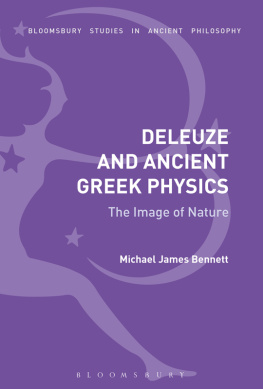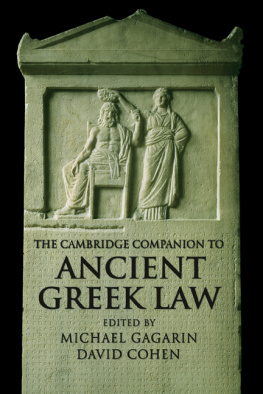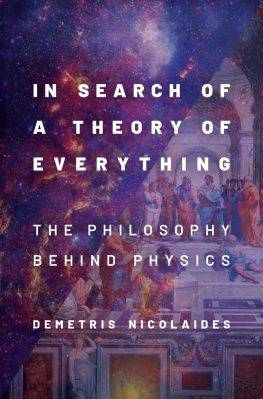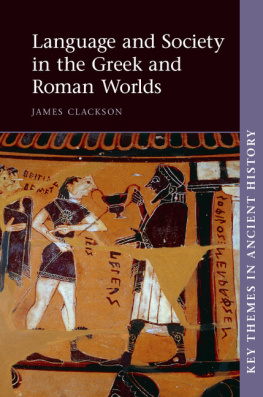Deleuze and Ancient Greek Physics
Also available from Bloomsbury:
A Comparative Analysis of Cicero and Aquinas, Charles P. Nemeth
Creation and the Function of Art, Jason Tuckwell
Deleuze and the Meaning of Life, Claire Colebrook
Dewey and the Ancients, edited by Christopher C. Kirby
Nietzsche as a Scholar of Antiquity, edited by Anthony K. Jensen and Helmut Heit
Plato and Plotinus on Mysticism, Epistemology, and Ethics, David J. Yount
The Poverty of Eros in Platos Symposium, Lorelle D. Lamascus
Deleuze and Ancient Greek Physics
The Image of Nature
Michael James Bennett
Bloomsbury Academic
An imprint of Bloomsbury Publishing Plc

For their support of this project from its inception and their incisive feedback on an earlier version of it, I would like to thank Barry Allen, Ric Arthur, and Howard Jones. Sincere thanks also to Dan Smith and Keith Ansell Pearson for their useful feedback and welcome encouragement. My colleagues in the Department of Philosophy at McMaster University and the University of Kings College have indirectly improved the argument of this book with innumerable small questions that have honed and sharpened it. My gratitude also extends to the editors and production division at Bloomsbury Academic for their diligence. This work was funded, in part, by the Social Studies and Humanities Research Council of Canada, and made possible by the libraries at McGill University and Dalhousie University where it was, for the most part, written. Finally, Kait Pinder must be singled out for her unrelenting generosity.
Works by Deleuze and Guattari |
AV | The Actual and the Virtual |
B | Bergsonism |
CC | Essays Critical and Clinical |
D | Dialogues (with Claire Parnet) |
DI | Desert Islands and Other Texts 19531974 |
DR | Difference and Repetition |
EP | Expressionism in Philosophy: Spinoza |
F | The Fold: Leibniz and the Baroque |
FB | Francis Bacon: The Logic of Sensation |
K | Kants Critical Philosophy |
LN | Lucrce et le naturalisme |
LS | The Logic of Sense |
N | Negotiations: 19721990 |
NP | Nietzsche and Philosophy |
PI | Pure Immanence: Essays on a Life |
PS | Proust and Signs |
TP | A Thousand Plateaus: Capitalism and Schizophrenia. |
TRM | Two Regimes of Madness: Texts and Interviews 19751995 |
WP | What is Philosophy? |
Fragments and Testimonies |
DK | Die Fragmente der Vorsokratiker, edited by H. Diels and W. Kranz |
D.L. | Diogenes Laertius, Lives of Eminent Philosophers |
HP | The Hellenistic Philosophers, edited by A. A. Long and David Sedley |
S.E. M | Sextus Empiricus, Adversus Mathematicos |
S.E. PH | Sextus Empiricus, Purrhoneioi hupotuposeis |
SVF | Stoicorum Veterum Fragmenta, edited by H. von Arnim |
Other Authors |
CPR | Kant, Critique of Pure Reason |
[The Stoics] compare philosophy to an animal, likening logic to the bones and sinews, ethics to the fleshier parts, and physics to the soul.
Diogenes Laertius
Appreciating how exactly Gilles Deleuze appropriates concepts from ancient Greek philosophy, and from Hellenistic physics in particular, is crucial for grasping the significance of some of his best known and most important arguments, and for getting a sense of the shape of his thought as a whole. Deleuze develops many key concepts, like event, sense, difference, stratification, problem, differential, the virtual, and image of thought, in conversation with Plato, Chrysippus, Aristotle, and Epicurus.
Although Deleuze notoriously advocates the reversal of Platonism, this book moves beyond the prominence of Plato and focuses on his readings of the Stoics, Aristotle, and Epicurus. The influence of these other ancient Greek sources on Deleuze has remained less well understood (although by no means completely ignored), possibly because his references to them tend to be allusive and oblique. Deleuzes considerable classical erudition is often confined to footnotes, brief name-checks, or staggeringly condensed arguments. Part of my purpose here is, therefore, to reconstruct and critically evaluate Deleuzes interpretations of these philosophers in light of the extant texts and contemporary scholarship on Greek philosophy.
My approach combines an appreciation of Deleuzes wariness of the history of philosophy as a merely reproductive discipline, and his idiosyncratic approach to what he calls the historical mediators (intercesseurs) of his own thought, with the rich philological, linguistic, and logical methods of analytic history of philosophy. This tack reveals not only how important the Stoics and Epicureans are to Deleuzethe influence of the latter seems to have been seriously underappreciatedbut also how these Hellenistic sources explain Deleuzes characteristic ambition to treat thought and naturenous and phusis, the theory of ideas and of biological genesis, idealism and naturalismas inextricably linked. The manner in which he reads Hellenistic physics reveals why it is that Deleuzes concern for what he calls images of thought (the dogmatic one he criticizes and the alternative, problematic or chaotic one he advocates) goes hand in hand with a concern for, so to speak, images of nature. Treating Deleuze as a voice in the commentary tradition on ancient Greek philosophy is the method, but the result is to reveal the connection between Deleuzes concern for images of thought and the philosophy of nature.
The history of philosophy and the dogmatic image of thought
Deleuze was deeply ambivalent about the history of philosophy as a discipline. He once gloomily mused:
The history of philosophy has always been the agent of power in philosophy, and even in thought. It has played the repressors role; how can you think without having read Plato, Descartes, Kant and Heidegger, and so-and-sos book about them? A formidable school of intimidation which manufactures specialists in thoughtbut which also makes those who stay outside conform all the more to this specialism which they despise. An image of thought called philosophy has been formed historically and it effectively stops people from thinking. (D 13)
When Deleuze talks about images of thought, he is usually concerned with showing what they suppress and exclude. As a methodological notion, the image of thought basically means a set of assumptions at work about what thought is supposed to be, what counts as thought, or what thinking properly is. The dominant image of thought is inevitably normative and value laden; Deleuze says dogmatic and moral (DR 131). How can the oppressive image involved in the history of philosophy liberate thought and develop its untapped potentials?
Next page



![Michael Lovano - The World of Ancient Greece: A Daily Life Encyclopedia [2 Volumes]](/uploads/posts/book/268736/thumbs/michael-lovano-the-world-of-ancient-greece-a.jpg)





